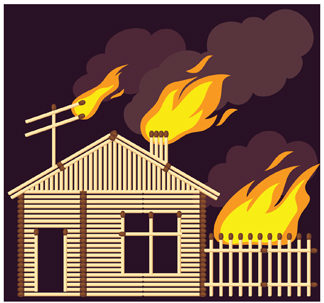 (Editor's Note: This article has been contributed by Melody S. Mosley, a partner at Cummins & White, LLP, a business and insurance law firm based in Newport Beach, Calif.)
(Editor's Note: This article has been contributed by Melody S. Mosley, a partner at Cummins & White, LLP, a business and insurance law firm based in Newport Beach, Calif.)
Late one evening, a woman awakened to find her home on fire. Although she escaped unharmed, the house was completely destroyed. A fire department investigation later revealed her husband had intentionally set the fire. The couple technically owned the home together but planned to divorce, and the woman wanted to stay in the house. The home was insured, and so the wife submitted a claim. But was their homeowners' coverage still valid based on the intentional act of her husband? Did the wife have a right to recover? In California and in a growing number of states, the answer is “yes.”
Traditionally, when property was jointly owned, the innocent spouse would be out of luck because of the typical policy language barring coverage for fire damage because of the intentional act of a co-insured. The theory behind this result was to ensure the guilty party did not profit from the act. Now, however, recent court decisions are making it harder to enforce intentional act exclusions for “innocent co-insureds” in homeowners' fire losses no matter how the exclusion is worded.
Recommended For You
Want to continue reading?
Become a Free PropertyCasualty360 Digital Reader
Your access to unlimited PropertyCasualty360 content isn’t changing.
Once you are an ALM digital member, you’ll receive:
- Breaking insurance news and analysis, on-site and via our newsletters and custom alerts
- Weekly Insurance Speak podcast featuring exclusive interviews with industry leaders
- Educational webcasts, white papers, and ebooks from industry thought leaders
- Critical converage of the employee benefits and financial advisory markets on our other ALM sites, BenefitsPRO and ThinkAdvisor
Already have an account? Sign In Now
© 2025 ALM Global, LLC, All Rights Reserved. Request academic re-use from www.copyright.com. All other uses, submit a request to [email protected]. For more information visit Asset & Logo Licensing.








